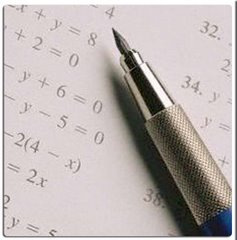If two non-zero positive integers p and q are such that p = 4q and p < 8, then q =
(A) 1 (B) 2 (C) 3 (D) 4 (E) 5
Monday, April 30, 2007
Subscribe to:
Post Comments (Atom)
is intended to be a spot where any student preparing for GRE can discuss study topics,find or provide tips & works towards a top score along with other students working for the same goal.Answer"GRE WORD OF THE DAY", "GRE SENTENCE COMPLETION OF THE DAY", "GRE ANALOGY OF THE DAY", "GRE ANTONYM OF THE DAY", "GRE MATH PROBLEM OF THE DAY", "GRE ALGEBRA QUESTION OF THE DAY", "GRE GEOMETRY QUESTION OF THE DAY"& "GRE PASSAGE OF THE WEEK". To get a top score,the first step of the ladder starts from here.

4 comments:
A
a,simple
A
Dividing both sides of the equation p = 4q by 4, we get q = p/4. We are also given that p < 8. Dividing
both sides of this inequality by 4 yields, p/4 < 8/4. Simplifying it, we get p/4 < 2. But q = p/4. Hence, q < 2.
The only non-zero positive integer less than 2 is 1. Hence, q = 1. The answer is (A).
Post a Comment